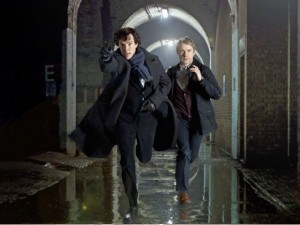Sherlock Holmes: You know the one. The century-old fictional detective created by Sir Arthur Conan Doyle. The logical, brilliant and eccentric character remains, to this day, one of the most famous “consulting detectives” in Scotland Yard and throughout the world.
This past summer the BBC produced a new series, “Sherlock,” that propelled the enigmatic Holmes through time right into London 2010. Penned by Steven Moffat and Mark Gatiss, the three episode series (short even for a BBC series) was an instant success. A couple of weeks ago, the British show made its way to the states airing on PBS as the “Masterpiece Mystery” on Sunday evenings for three weeks. Two episodes in, it is obvious why this modernized version of a 19th century sleuth has become so popular.
In many ways “Sherlock” is very much the same mystery story as in Doyle’s original version. Holmes’ sidekick, John Watson (Martin Freeman, aka the newly appointed Hobbit), is again a soldier just out of Afghanistan. Holmes (Benedict Cumberbatch, a runner up for playing the eleventh Doctor in “Doctor Who”) still resides at the same Baker Street address he has always inhabited — and it is just as disorganized and cluttered. “The game is afoot” has turned into “The game is on.” The mystery, the intrigue and the compelling stories are all still there.
What is different is the way the story is told. This 2010 reincarnation of Holmes is truly a modernized character. Like any true 21st century individual, he is attached at the hip to his BlackBerry. He uses the ample amount of technology he has at his fingertips to find out what he needs. Director Paul McGuigan, along with Moffat and Gatiss, uses modern London to construct a vision that allows the audience to see through Holmes’s eyes.
In one scene of the pilot episode, as Holmes examines a particular victim, the audience is given a peek at the thought process he is going through at lightening speed. As he walks around her body, words pop up on the screen: dry, wet, clean, dirty. One side of her coat is dry, one side is wet. Instantly Holmes knows which part of London she is traveling from and how long ago she arrived. Necklace is clean, bracelet is clean, wedding ring is dirty. Inside of the ring is clean. Duh, she’s unhappily married.
When I see a wedding ring, the only thought through my head is that the person is married, not whether or not they are happily married. Not, “I wonder how many times she takes the ring off everyday.”
That’s what is so enchanting about this resurrection of Holmes. We don’t just watch a quirky, odd, genius detective. The show makes us think about the details that we miss every single day — the snippets of conversations we overhear, the Facebook stalking that everyone does, or the shallow judgments you might make based on someone’s outfit.
Holmes’ snap assumptions force us to recognize the truth hidden by those thoughts. If you were to just take those thoughts one step further, and subtract any personal interest in the matter, you might be able to sleuth your way into discovering an entire past, like Holmes does to Watson within seconds of meeting him.
McGuigan does an astonishing job at clueing the audience into the quirks and kinks of how Holmes’s brain works. Text messages type themselves out on the screen for us to see. The camera zooms in on things we should have noticed. Flashes to his thoughts allow us to see clues he notices at a moment’s glance.
The active participation throughout the episodes makes it feel as if we’re solving the crime alongside Holmes, rather than just watching him do it alone. But he is always one step ahead of the game, leaving us wanting more and waiting to discover the outcome, just like the police and detectives he leaves in his wake.
Cumberbatch and Freeman do a remarkable job of playing this odd “bromance” with a perfect balance of obscurity and heart. Cumberbatch is just weird enough that you understand why one of the cops harshly tells Watson, “One day, we’ll be standing around a body and Sherlock Holmes will be the one that put it there … He’s a psychopath. Psychopaths get bored.” Yet he is just sane and likeable enough that we believe him when he responds, “I’m not a psychopath. I’m a high-functioning sociopath. Do your research.”
Freeman’s skeptical and slightly amused response to finding himself living with Holmes works flawlessly with his growing trust and liking for his new flatmate.
With only one more episode left in this far too short first season, “Sherlock” has offered a renewed respect for these beloved characters. The modernization of Doyle’s stories has brought back the mystique of the characters in a way that reminds the 21st century audience what made them so famous in the first place. “Sherlock” will return with another three episodes in the fall of 2011, far too far away in my humble opinion. Until then, “the game is on.”
“Sherlock” airs Sunday on PBS at 9 p.m.
Rosenberg is a member of the class of 2012.


